英语中副词及用法
副词的用法和位置
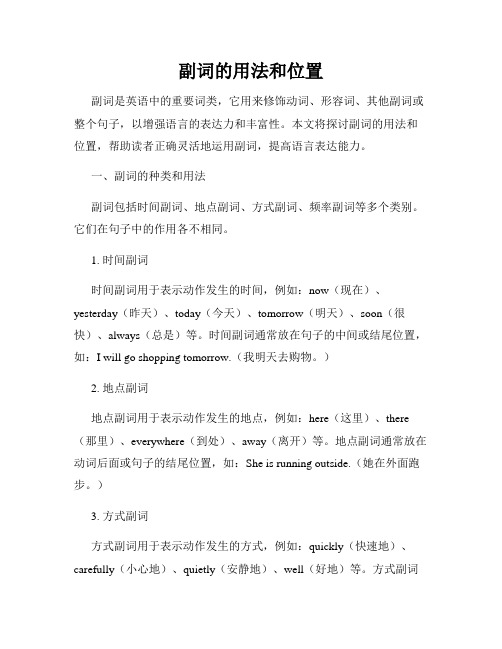
副词的用法和位置副词是英语中的重要词类,它用来修饰动词、形容词、其他副词或整个句子,以增强语言的表达力和丰富性。
本文将探讨副词的用法和位置,帮助读者正确灵活地运用副词,提高语言表达能力。
一、副词的种类和用法副词包括时间副词、地点副词、方式副词、频率副词等多个类别。
它们在句子中的作用各不相同。
1. 时间副词时间副词用于表示动作发生的时间,例如:now(现在)、yesterday(昨天)、today(今天)、tomorrow(明天)、soon(很快)、always(总是)等。
时间副词通常放在句子的中间或结尾位置,如:I will go shopping tomorrow.(我明天去购物。
)2. 地点副词地点副词用于表示动作发生的地点,例如:here(这里)、there (那里)、everywhere(到处)、away(离开)等。
地点副词通常放在动词后面或句子的结尾位置,如:She is running outside.(她在外面跑步。
)3. 方式副词方式副词用于表示动作发生的方式,例如:quickly(快速地)、carefully(小心地)、quietly(安静地)、well(好地)等。
方式副词通常放在动词前面或句子的中间位置,如:He speaks English fluently.(他流利地说英语。
)4. 频率副词频率副词用于表示动作发生的频率,例如:often(经常)、sometimes(有时)、rarely(很少)、never(从不)等。
频率副词通常放在动词前面或句子的中间位置,如:She always arrives late for meetings.(她总是迟到开会。
)二、副词的位置副词根据其种类和实际情况,可出现在句子的不同位置,以起到最佳的修饰作用。
1. 修饰动词副词常用于修饰动词,放在动词之前或之后。
例如:He quickly ran to catch the bus.(他迅速地跑去赶公交车。
副词的用法和修饰方式

副词的用法和修饰方式副词是英语中一类重要的词性,常用于修饰动词、形容词、其他副词以及整个句子等。
它能够提供关于时间、地点、方式、程度等方面的信息,使句子更加丰富、准确。
本文将介绍副词的用法和修饰方式,帮助读者正确使用并灵活运用副词。
一、副词的用法1. 修饰动词:副词可以描述一个动作是如何进行的,常放在动词之前。
例如:- He ran quickly to catch the bus.(他快速地跑去赶公交车。
)- She always listens attentively during class.(她上课时总是认真聆听。
)2. 修饰形容词或副词:副词可以提供有关形容词或副词的程度或方式信息,常放在形容词或副词之前。
例如:- It was an extremely difficult exam.(那是一场非常困难的考试。
) - She sings beautifully.(她唱得很美。
)3. 修饰整个句子:副词可以表达整个句子的态度、观点或情感色彩,常放在句首或句末。
例如:- Fortunately, I passed the exam.(幸运地,我通过了考试。
)- Frankly speaking, I don't agree with your opinion.(坦率地说,我不同意你的观点。
)4. 修饰其他副词或短语:副词可以修饰其他副词或短语,用以提供更加详细的信息。
例如:- He speaks English fluently and confidently.(他英语说得流利且自信。
)- They arrived at the destination relatively early.(他们相对较早到达目的地。
)二、副词的修饰方式1. 程度副词:程度副词用来描述动词、形容词或其他副词的程度。
常见的程度副词包括:very、extremely、highly、quite等。
例如: - She was very tired after running a marathon.(她跑完马拉松后非常累。
英语副词的用法总结
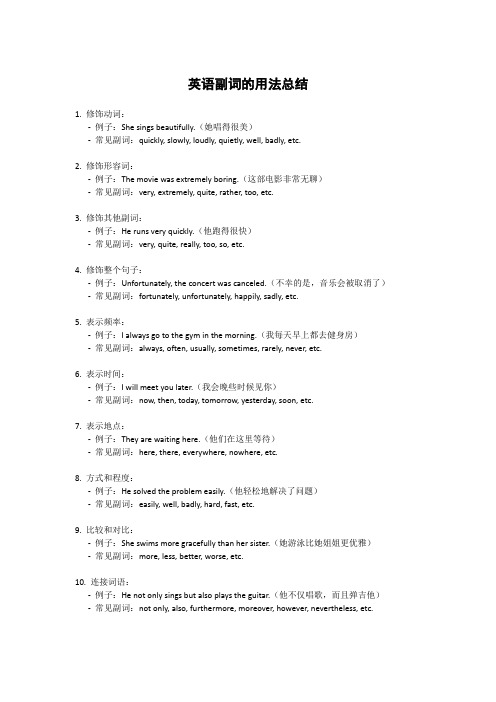
英语副词的用法总结1. 修饰动词:-例子:She sings beautifully.(她唱得很美)-常见副词:quickly, slowly, loudly, quietly, well, badly, etc.2. 修饰形容词:-例子:The movie was extremely boring.(这部电影非常无聊)-常见副词:very, extremely, quite, rather, too, etc.3. 修饰其他副词:-例子:He runs very quickly.(他跑得很快)-常见副词:very, quite, really, too, so, etc.4. 修饰整个句子:-例子:Unfortunately, the concert was canceled.(不幸的是,音乐会被取消了)-常见副词:fortunately, unfortunately, happily, sadly, etc.5. 表示频率:-例子:I always go to the gym in the morning.(我每天早上都去健身房)-常见副词:always, often, usually, sometimes, rarely, never, etc.6. 表示时间:-例子:I will meet you later.(我会晚些时候见你)-常见副词:now, then, today, tomorrow, yesterday, soon, etc.7. 表示地点:-例子:They are waiting here.(他们在这里等待)-常见副词:here, there, everywhere, nowhere, etc.8. 方式和程度:-例子:He solved the problem easily.(他轻松地解决了问题)-常见副词:easily, well, badly, hard, fast, etc.9. 比较和对比:-例子:She swims more gracefully than her sister.(她游泳比她姐姐更优雅)-常见副词:more, less, better, worse, etc.10. 连接词语:-例子:He not only sings but also plays the guitar.(他不仅唱歌,而且弹吉他)-常见副词:not only, also, furthermore, moreover, however, nevertheless, etc.。
(完整word版)英语中副词及用法
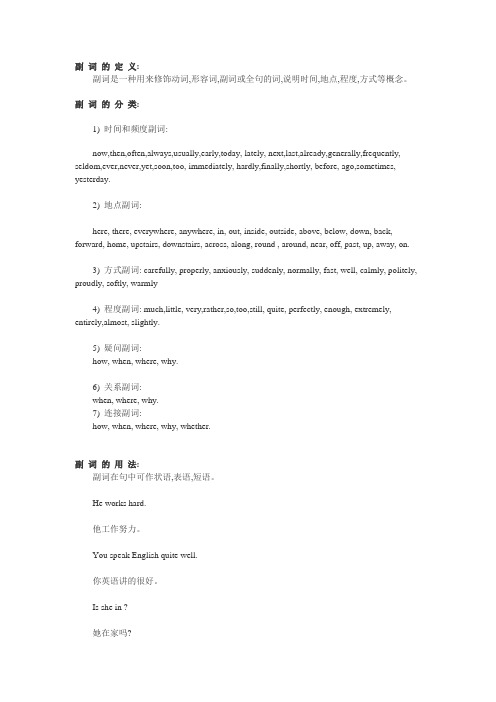
副词的定义:副词是一种用来修饰动词,形容词,副词或全句的词,说明时间,地点,程度,方式等概念。
副词的分类:1) 时间和频度副词:now,then,often,always,usually,early,today, lately, next,last,already,generally,frequently, seldom,ever,never,yet,soon,too, immediately, hardly,finally,shortly, before, ago,sometimes, yesterday.2) 地点副词:here, there, everywhere, anywhere, in, out, inside, outside, above, below, down, back, forward, home, upstairs, downstairs, across, along, round , around, near, off, past, up, away, on.3) 方式副词: carefully, properly, anxiously, suddenly, normally, fast, well, calmly, politely, proudly, softly, warmly4) 程度副词: much,little, very,rather,so,too,still, quite, perfectly, enough, extremely, entirely,almost, slightly.5) 疑问副词:how, when, where, why.6) 关系副词:when, where, why.7) 连接副词:how, when, where, why, whether.副词的用法:副词在句中可作状语,表语,短语。
He works hard.他工作努力。
英语副词的作用及用法
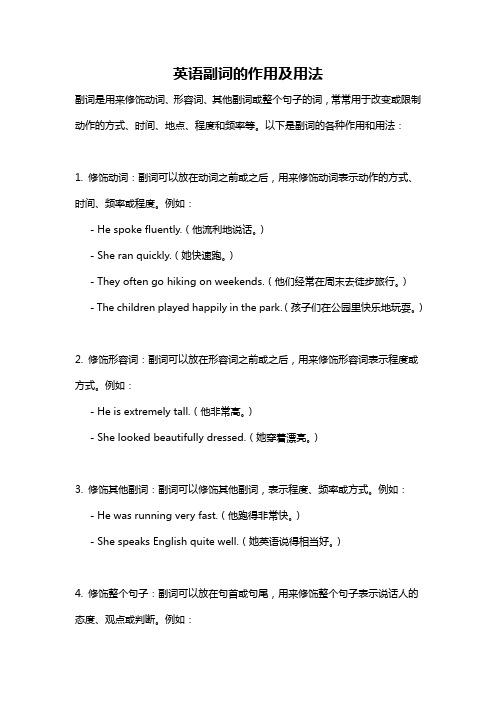
英语副词的作用及用法副词是用来修饰动词、形容词、其他副词或整个句子的词,常常用于改变或限制动作的方式、时间、地点、程度和频率等。
以下是副词的各种作用和用法:1. 修饰动词:副词可以放在动词之前或之后,用来修饰动词表示动作的方式、时间、频率或程度。
例如:- He spoke fluently.(他流利地说话。
)- She ran quickly.(她快速跑。
)- They often go hiking on weekends.(他们经常在周末去徒步旅行。
)- The children played happily in the park.(孩子们在公园里快乐地玩耍。
)2. 修饰形容词:副词可以放在形容词之前或之后,用来修饰形容词表示程度或方式。
例如:- He is extremely tall.(他非常高。
)- She looked beautifully dressed.(她穿着漂亮。
)3. 修饰其他副词:副词可以修饰其他副词,表示程度、频率或方式。
例如:- He was running very fast.(他跑得非常快。
)- She speaks English quite well.(她英语说得相当好。
)4. 修饰整个句子:副词可以放在句首或句尾,用来修饰整个句子表示说话人的态度、观点或判断。
例如:- Luckily, I found my keys.(幸运的是,我找到了我的钥匙。
)- Unfortunately, he couldn't join us for dinner.(不幸的是,他不能和我们一起吃晚餐。
)此外,副词还有许多特殊用法,如比较级和最高级形式(例如better, best)、表示否定(例如not, never)、表示位置(例如here, there)、表示时间(例如now, then)等。
需要注意的是,有些副词与形容词形式相同,例如fast既可以是形容词(表示快的),也可以是副词(表示快速地)。
英语中副词及用法规律总结
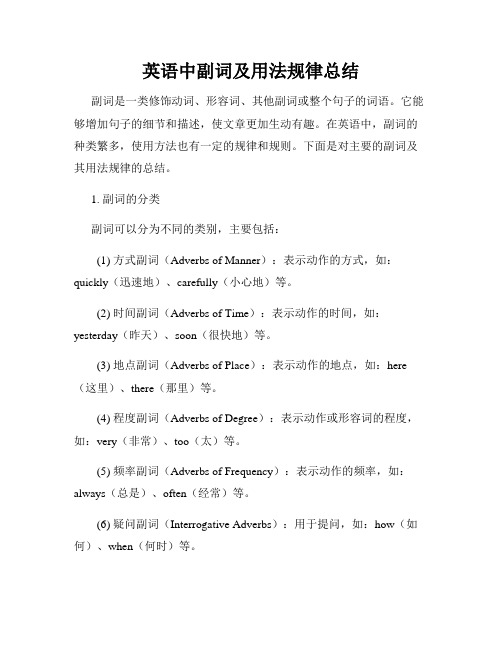
英语中副词及用法规律总结副词是一类修饰动词、形容词、其他副词或整个句子的词语。
它能够增加句子的细节和描述,使文章更加生动有趣。
在英语中,副词的种类繁多,使用方法也有一定的规律和规则。
下面是对主要的副词及其用法规律的总结。
1. 副词的分类副词可以分为不同的类别,主要包括:(1) 方式副词(Adverbs of Manner):表示动作的方式,如:quickly(迅速地)、carefully(小心地)等。
(2) 时间副词(Adverbs of Time):表示动作的时间,如:yesterday(昨天)、soon(很快地)等。
(3) 地点副词(Adverbs of Place):表示动作的地点,如:here (这里)、there(那里)等。
(4) 程度副词(Adverbs of Degree):表示动作或形容词的程度,如:very(非常)、too(太)等。
(5) 频率副词(Adverbs of Frequency):表示动作的频率,如:always(总是)、often(经常)等。
(6) 疑问副词(Interrogative Adverbs):用于提问,如:how(如何)、when(何时)等。
(7) 连接副词(Conjunctive Adverbs):用于连接句子,如:however(然而)、therefore(因此)等。
2. 副词的用法规律(1) 修饰动词:副词可以用来修饰动词,描述动作的方式、时间、地点等,如:He runs quickly(他跑得快)。
(2) 修饰形容词:副词可以用来修饰形容词,表示形容词的程度,如:It's very hot(非常热)。
(3) 修饰其他副词:副词可以用来修饰其他副词,表示程度、方式等,如:He speaks very fluently(他说得非常流利)。
(4) 修饰整个句子:副词可以用来修饰整个句子,表示说话者的观点、态度等,如:Certainly, I will help you(当然,我会帮助你)。
副词用法总结
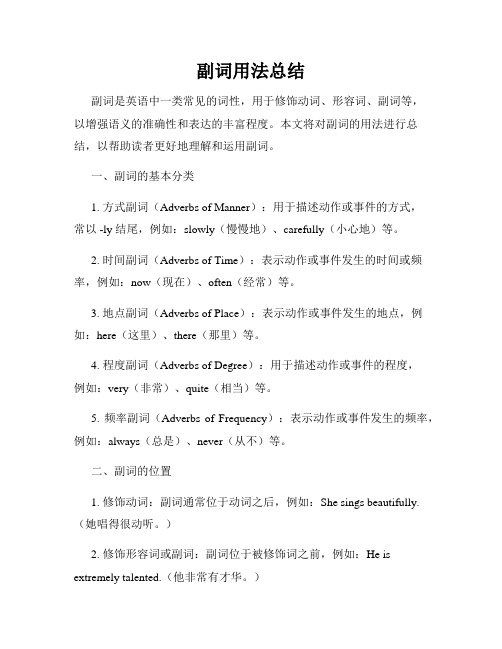
副词用法总结副词是英语中一类常见的词性,用于修饰动词、形容词、副词等,以增强语义的准确性和表达的丰富程度。
本文将对副词的用法进行总结,以帮助读者更好地理解和运用副词。
一、副词的基本分类1. 方式副词(Adverbs of Manner):用于描述动作或事件的方式,常以 -ly 结尾,例如:slowly(慢慢地)、carefully(小心地)等。
2. 时间副词(Adverbs of Time):表示动作或事件发生的时间或频率,例如:now(现在)、often(经常)等。
3. 地点副词(Adverbs of Place):表示动作或事件发生的地点,例如:here(这里)、there(那里)等。
4. 程度副词(Adverbs of Degree):用于描述动作或事件的程度,例如:very(非常)、quite(相当)等。
5. 频率副词(Adverbs of Frequency):表示动作或事件发生的频率,例如:always(总是)、never(从不)等。
二、副词的位置1. 修饰动词:副词通常位于动词之后,例如:She sings beautifully.(她唱得很动听。
)2. 修饰形容词或副词:副词位于被修饰词之前,例如:He is extremely talented.(他非常有才华。
)3. 修饰句子:副词位于句子开头或结尾,例如:Certainly, I will help you.(当然,我会帮助你。
)三、副词的比较级和最高级1. 比较级:用于表示两个事物之间的比较,通常在副词前加更(more)或-er,并在副词后加than,例如:She runs more quickly than him.(她跑得比他快。
)2. 最高级:用于表示三个或三个以上事物之间的比较,通常在副词前加most(形容词前为the most)或-est,并在副词后加of,例如:He speaks the most fluently of all.(他说话是所有人中说得最流利的。
英语副词的用法归纳总结

英语副词的用法归纳总结英语副词( Adverbs)是一类词汇,用来修饰动词、形容词、其他副词或整个句子,以表达时间、地点、程度、方式或频率等概念。
以下是英语副词的用法归纳总结:1.(修饰动词•程度副词( Adverbs(of(Degree):(表示程度或强度,如("very" 非常)、"extremely"( 极其)、"quite"( 相当)、"rather"( 有点)、"too" 太)、"enough" 足够)等。
•例句:She(speaks(very(softly.•方式副词 Adverbs(of(Manner):(描述动作或事件的方式,如("slowly" 慢慢地)、"carefully" 小心地)、"quickly" 快速地)、"happily" 快乐地)等。
•例句:He(ran(quickly(to(catch(the(bus.•频率副词 Adverbs(of(Frequency):(表示动作发生的频率,如("always"( 总是)、"often"( 经常)、"sometimes"( 有时候)、"never" 从不)、"rarely" 很少)等。
•例句:She(always(arrives(early(for(work.2.(修饰形容词或其他副词•程度副词 Adverbs(of(Degree):(可以用来修饰形容词或其他副词,以增强或减弱它们的含义。
•例句:The(weather(is(very(hot(today.(She(sings(extremely(well.3.(修饰句子•状语 Adverbial(Phrase):(由一个或多个副词构成的短语,用来修饰整个句子,表达时间、地点、条件、原因等。
- 1、下载文档前请自行甄别文档内容的完整性,平台不提供额外的编辑、内容补充、找答案等附加服务。
- 2、"仅部分预览"的文档,不可在线预览部分如存在完整性等问题,可反馈申请退款(可完整预览的文档不适用该条件!)。
- 3、如文档侵犯您的权益,请联系客服反馈,我们会尽快为您处理(人工客服工作时间:9:00-18:30)。
副词的定义:
副词是一种用来修饰动词,形容词,副词或全句的词,说明时间,地点,程度,方式等概念。
副词的分类:
1) 时间和频度副词:
now,then,often,always,usually,early,today, lately, next,last,already,generally,frequently, seldom,ever,never,yet,soon,too, immediately, hardly,finally,shortly, before, ago,sometimes, yesterday.
2) 地点副词:
here, there, everywhere, anywhere, in, out, inside, outside, above, below, down, back, forward, home, upstairs, downstairs, across, along, round , around, near, off, past, up, away, on.
3) 方式副词: carefully, properly, anxiously, suddenly, normally, fast, well, calmly, politely, proudly, softly, warmly
4) 程度副词: much,little, very,rather,so,too,still, quite, perfectly, enough, extremely, entirely,almost, slightly.
5) 疑问副词:
how, when, where, why.
6) 关系副词:
when, where, why.
7) 连接副词:
how, when, where, why, whether.
副词的用法:
副词在句中可作状语,表语,短语。
He works hard.
他工作努力。
You speak English quite well.
你英语讲的很好。
Is she in ?
她在家吗?
Let's be out.
让我们出去吧。
Food here is hard to get.
这儿很难弄到食物。
副词的位置:
1) 多数副词都可以放在动词的后面,如果动词带有宾语,副词就放在宾语后面。
I get up early in the morning everyday.
我每天早早起床。
He gave me a gift yesterday.
他昨天给了我一件礼物。
She didn't drink water enough.
她没喝够水。
The train goes fast.
火车跑得快。
We can go to this school freely.
我们可以免费到这家学校学习。
They left a life hardly then.
当时他们的生活很艰难。
He has a new cat on today.
他今天戴了一顶新帽子。
I have seen this film twice with my friends.
这部电影我和朋友看过两次。
2) 副词修饰形容词,副词时,副词在前面,而被修饰的词在后面。
It's rather easy, I can do it.
这很容易,我能做到。
He did it quite well.
他做得相当好。
It's rather difficult to tell who is right.
很难说谁是对的。
It's so important that I must tell my friends.
这件事太重要了,我得告诉我的朋友。
It's much better.
好多了。
3) 频度副词可放在实义动词的前面,情态动词和助动词的后面。
I often help him these days.
这些日子我经常帮助他。
I always remember the day when I first came
to this school.
我常常记得我第一次来学校的那一天。
You mustn't always help me.
你不能老是帮助我。
He seldom comes to see us.
他很少来看我们。
We usually go shopping once a week.
我们通常一周买一次东西。
The new students don't always go to dance.
新学生并不时常去跳舞。
4) 疑问副词,连接副词,关系副词以及修饰整个句子的副词,通常放在句子或从句的前面。
When do you study everyday?
你每天什么时间学习?
Can you tell me how you did it?
你能告诉我你如何做的吗?
First, let me ask you some questions.
先让我来问几个问题。
How much does this bike cost?
这辆车子多少钱?
Either you go or he comes.
不是你去就是他来。
The students were reading when the teacher came into the classroom.
当老师进教室时,学生们正在读书。
5) 时间副词和地点副词在一个句中, 地点副词在前面时间副词在后面。
We went shopping in the supermarket at 9 o'clock yesterday.
昨天九点钟我们到超市买东西了.
What were you doing in the classroom yesterday evening?
昨天下午你在教室里干什么?
The accident took place one hour ago in the Eleven Avenue.
一小时前十一号大街发生了一场事故。
副词的比较等级:
副词和形容词一样,也有它的比较级和最高级形式. 可以参考形容词的变换形式。
但以词尾-ly 结尾的副词(除early )须用more 和most 。
hard harder hardest
fast faster fastest
early earlier earliest
much more most
warmly more warmly most warmly
单音节副词的比较级是在副词后面加上-er 构成的,最高级是在副词后面加上-est 构成的。
near nearer nearest
hard harder hardest
多音节副词的比较级是在副词的前面加上-more 构成的。
最高级是在副词前面加上-most 构成的。
warmly more warmly most warmly
successfully more successfully most successfully
有些副词的比较级和最高级形式是不规则的。
well-better - best little - less - least
Much- more - most badly - worse - worst
far-farther(further)-farthest(furthest)
副词的比较级和最高级用法同形容词的比较级用法基本一样。
最高级形式句中the 可
以省略。
He works harder than I.
他比我工作努力。
Lucy gets up earlier than Lili.
露西比丽丽起床早。
He runs fastest in our class.
他在我们班跑地最快。
He dives deeper than his teammates.
他比他的队员潜水深。
It's true that he speak English more fluently than any of us.
他英语讲的确实比我们任何人都好。
Our school team play football best in our region.
我们校队在我们地区足球踢得最好的。
【下载本文档,可以自由复制内容或自由编辑修改内容,更多精彩文章,期待你的好评和关注,我将一如既往为您服务】。
